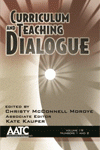
Curriculum and Teaching Dialogue
Vol. 19 # 1 & 2
Edited by:
Christy M. Moroye, University of Northern Colorado
A volume in the series: Curriculum & Teaching Dialogue. Editor(s): Chara Haeussler Bohan, Georgia State University. John L. Pecore, University of West Florida. Franklin S. Allaire, University of Houston-Downtown.
Published 2017
Curriculum and Teaching Dialogue (CTD) is a publication of the American Association of Teaching and Curriculum (AATC), a national learned society for the scholarly field of teaching and curriculum. The field includes those working on the theory, design and evaluation of educational programs at large. At the university level, faculty members identified with this field are typically affiliated with the departments of curriculum and instruction, teacher education, educational foundations, elementary education, secondary education, and higher education.
CTD promotes all analytical and interpretive approaches that are appropriate for the scholarly study of teaching and curriculum. In fulfillment of this mission, CTD addresses a range of issues across the broad fields of educational research and policy for all grade levels and types of educational programs.
CONTENTS
Acknowledgments. Presidential Address—Educational Montage: Constructing and Editing Exploratory Learning, William L. White. AATC Keynote Address: Corporate Power and Corporeal Control: Aspirations for Agency and Democracy in the Era of Educational Repression, Kenneth J. Saltman. President’s Message—Higher Ground, Kevin Cloninger. Editor’s Notes—Envisioning “True Intelligence” in and Through Our Communities, Christy McConnell Moroye. VOLUME 19, NUMBER 1. 1. Queering Teacher Education Curriculum: A Case Study of Lessons Learned in the Transformation of a Teacher Education Program, Jerry Rosiek, Alison Schmitke, and Julie Heffernan. 2. Deep Curriculum: Guiding the Inner Lives of Early Career Teachers, Kristina M. Valtierra and Paul Michalec. 3. Forsaking Neutrality in Political Science: Making the Case to Intellectually Assassinate, Janiece Z. Mackey. 4. Teaching for Equity in the Milieu of White Fragility: Can Children’s Literature Build Empathy and Break Down Resistance? Amy L. Masko and Patricia L. Bloem. 5. The Overlooked Context: Pedagogies for Engagement and Empowerment at the Community College, Joseph Flynn, Robin James, Tara Mathien, Pardess Mitchell, and Stephanie Whalen. 6. In Students’ Best Interest: What are Teacher Views of Ethical Learning and Leading? Carol A. Mullen. 7. Constructivist Approaches Online and Face-to-Face: The Essential Role of Trust, Rebecca Pruitt. VOLUME 19, NUMBER 2. Editor’s Notes— Place-Consciousness Toward Diversity and Multiculturalism Through the Ecology of Schooling, Christy McConnell Moroye. 1. Community-Engaged Curriculum Development: Working With Middle School Students, Teachers, Principals, and Stakeholders for Healthier Schools, Benjamin C. Ingman, Katie Lohmiller, Nick Cutforth, Laura Borley, and Elaine S. Belansky. 2. Tea Cakes and Sweet Potato Pie for All: Student Responses to African American Stories in Mathematics, Amy Corp. 3. Investigating the Practical Intention to Maintain Lesson Momentum: Implications for Teacher Education, Aaron Samuel Zimmerman. 4. The Uses of the Past in Pedagogy: Teachers’ Ambivalent Relationships to the Histories They Teach, Stephanie C. Konle. 5. The Reality of Research-Based Practices in Finnish Elementary Teacher Education Programs, Ashleigh Franco. 6. “To Think What We Are Doing”: A Challenge of Our Time for the School of Education, Cara Furman. 7. Black Lives, Literacies, and Homelessness in the Smog of Whiteness, Mary M. Jacobs. OUTTAKES. Associate Editor’s Notes—Curators of Facts, Docents of Truth, Kate Kauper. Research as Vision Quest Into Indigenous Epistemology, Marva McClean and Marcus Waters. Who Owns the Data, Shares the Stories, and Has Final Responsibility? The Borderland Spaces Between Narrative Inquiry and Funded Grant Work, Stephanie Behm Cross. Negotiating Curriculum-Based Teacher Leadership, Daniel J. Castner. Guarding Against Simpson’s Paradox When Combining Data Sets, Bonni S. Cohen and Peggy L. Moch. BOOK REVIEWS. Transitioning to Concept-Based Curriculum and Instruction By H. Lynn Erickson and Lois A. Lanning, Kaminsia Fannin. Reclaiming the Multicultural Roots of U.S. Curriculum: Communities of Color and Official Knowledge in Education By Wayne Au, Anthony L. Brown, and Dolores Caldero, Tanji Reed Marshall. FILM REVIEW. Most Likely to Succeed, Karen Kusiak. About the Authors.
-
Paperback9781641130318
Web price: $45.04 (Reg. 52.99)
-
Hardcover9781641130325
Web price: $80.74 (Reg. 94.99)
- eBook9781641130332

-
 Curriculum and Teaching Dialogue
Volume 24, Numbers 1 & 2, 2022
Curriculum and Teaching Dialogue
Volume 24, Numbers 1 & 2, 2022
-
 Curriculum and Teaching Dialogue
Volume 25, Numbers 1 & 2, 2023
Curriculum and Teaching Dialogue
Volume 25, Numbers 1 & 2, 2023
-
 Curriculum and Teaching Dialogue
Vol. 18 # 1 & 2
Curriculum and Teaching Dialogue
Vol. 18 # 1 & 2
-
 Curriculum and Teaching Dialogue
Vol. 20 # 1 & 2
Curriculum and Teaching Dialogue
Vol. 20 # 1 & 2
-
 Curriculum and Teaching Dialogue
Vol. 21 # 1 & 2
Curriculum and Teaching Dialogue
Vol. 21 # 1 & 2
-
 Curriculum and Teaching Dialogue
Vol. 22 # 1 & 2
Curriculum and Teaching Dialogue
Vol. 22 # 1 & 2
-
 Curriculum and Teaching Dialogue
Vol. 23 # 1 & 2
Curriculum and Teaching Dialogue
Vol. 23 # 1 & 2

